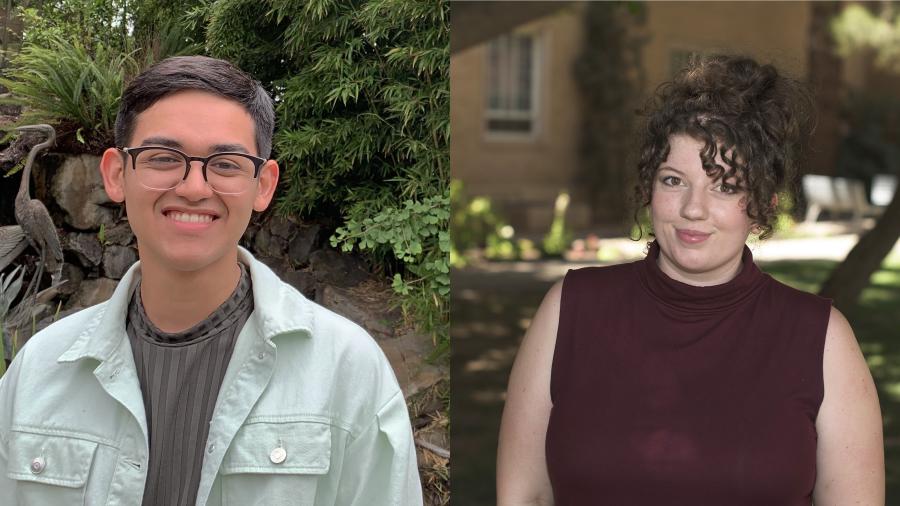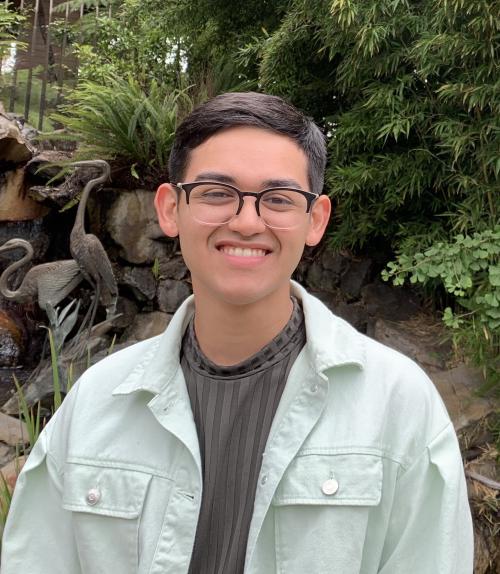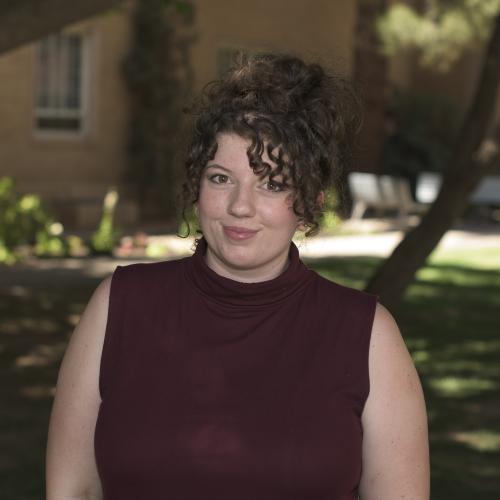Souls of SOLS, September 2024: Highlighting graduate student stories

Luis Gutierrez, left, is a 5th year PhD candidate in the ecology, economics, and ethics of the environment track in the Biology and Society program. Amalie Strange, right, is a 5th year PhD candidate in the Animal Behavior program.
Note: This story is part of an ongoing series profiling graduate students in the School of Life Sciences. See May's featured students here.
Luis Gutierrez – Biology and Society PhD, ecology, economics, and ethics of the environment
Growing up in south Phoenix, the ocean and all its mind-boggling inhabitants seemed like the stuff of fantasy to Luis Gutierrez. By a young age, he had decided that if this underwater realm really existed, with its colorful sea stars, playful dolphins and oddly shaped seahorses, he was going to study it.
“You can literally ask my mom. I wanted to be a marine biologist since I was like five years old.”
When he got to ASU as an undergraduate, though, there were few opportunities to pursue marine biology in this land-locked state. He studied ecology instead, a discipline that made him fascinated with not only the crazy creatures that exist in the world, but in their relationships with each other and their ecosystems.

When it came time to look for a PhD program, Gutierrez met Dr. Beth Polidoro, a marine conservationist who works with the International Union for the Conservation of Nature on the Red List of Endangered Species. When they met, Polidoro was working on classifying the endangered status of corals and offered Gutierrez the chance to join the project.
Gutierrez explains that by studying coral reefs, “my love for the ocean and my training as an ecologist merged into one.”
Gutierrez started his PhD interested in making predictions about what corals are more likely to persist with climate change based on their traits and functions –– like the coral’s size, shape, and ability to photosynthesize –– and how the persistence of those corals might affect the entire ecosystem of a reef. Being able to make such predictions is important for conservationists who have to make decisions about which kinds of corals they might prioritize trying to save.
But as he started reading the work of other researchers making such predictions, Gutierrez started questioning how accurate they really were; they often only considered certain coral traits or made broad generalizations without considering a coral’s local context. That motivated Gutierrez to switch up his approach: he started his research by synthesizing many of the known studies on coral traits and function to assess how accurate those prediction models really might be. He hopes that will reveal to what extent scientists can actually make predictions about future reef ecosystems and help inform conservation decisions about which corals might be more important to keep around.
Pursuing a PhD has brought Gutierrez many unexpected opportunities. Here in Arizona, he’s served as the treasurer of E-board, the student government for the School of Life Sciences, and coordinated student groups. But it’s also gotten him out of Arizona: he’s attended conferences in Mexico and Germany and gone scuba diving off the coast of Bermuda looking for corals. Though for now, Gutierrez still lives in the desert, through his PhD, he’s finding his way to the ocean.
Amalie Strange – Animal Behavior PhD
Amalie Strange stands in the middle of a swarm of honeybees, holding her phone up close to two individuals passing nectar between one another.
“See that?” she asks the fifth-grade class on the other end of the Zoom call, before fielding their questions about a honeybee they saved from their pool or listening intently to the story of one kid who got stung.

Strange is a PhD student in the Amdam lab at ASU, which largely studies honeybee behavior and physiology. But rather than conducting experiments like her lab-mates, Strange uses honeybees as an entry point for digging into children’s relationships with nature. She Zooms elementary school classes to give them a “hive tour,” then interviews some students afterwards to ask about their connection to honeybees, as well as their broader connection to the environment.
“I've always loved interdisciplinary work, so I get to combine the social sciences and the natural sciences, and that just makes me so happy.”
Strange joined the Amdam lab as an undergraduate at ASU, studying how different stressors affect honeybees’ physiology. She thought she might study honeybees forever when she started her PhD with the lab, but Dr. Gro Amdam quickly saw Amalie’s love of outreach and education, encouraging Amalie to base her dissertation around that.
With that encouragement, Amalie quickly made a plan to start engaging with elementary schoolers at Title I schools, which are typically lower income, to understand the connections they’re forming to nature. Strange grew up lower income herself but remembers forming a love of nature regardless; she’d grind up the dry mesquite pods that fell from the tree in her front yard, smell and pick at her mother’s rosemary plant and gather up fragile red ocotillo blossoms after they fell off the spiny plant in the spring.
“Even though certain natural experiences weren't accessible for my family, I was still able to connect to nature in a way. So, I'm just really curious how other children are doing it these days.”
Strange’s curiosity has pushed her not only to map out an original interdisciplinary dissertation, but also take on innumerable side projects. She’s participated in a wide range of collaborations: one is fighting to get unhoused people protection for their pets, another entailed conducting surveys on digital nature education, and a third involved studying honeybees as a model for critical nonviolence. She also works for the Teaching and Learning Center, helping make classes more accessible for students, and serves as the president of E-board, the student government for the School of Life Sciences. In spring 2023, Strange even won a “Most innovative TA” award when she was helping teach animal physiology.
Strange hopes to go into academia after finishing her PhD, though she’s keeping her options open. Until then, you might find her making art with kids on a playground, peering into a beehive or staring up at an ocotillo like she did when she was young.